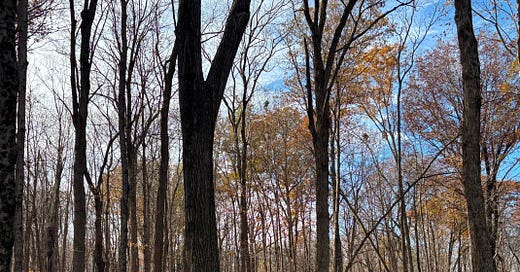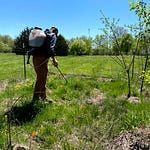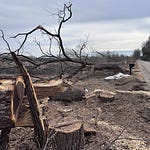This is the newsletter version of Sara by the Season, where I explore what is piquing my curiosity as I try to lean into nature’s wisdom and rhythms. You can listen to me read you the newsletter by hitting play above - or you can click the little link above and to the right to play in your favorite podcast player.
If you know someone who would like this sort of thing, I’d be so grateful if you would share it.
Disclaimer: I’m a privileged white lady. I’m not really writing this for LGBTQ people, immigrants, other marginalized folks, and those who love them who will be disproportionately impacted by another Trump presidency. I’m writing it solely from my experience as a privileged white woman who, despite telling herself to be prepared, was still shocked that most of the electorate would vote for the chaos and division of another Trump presidency.
Another disclaimer: I’m not actually calling anyone stupid with the title, but playing on the famous James Carville campaigning strategy.
I started writing this newsletter regularly during Covid. My first post was August of 2020. I wrote A LOT of posts about what an invitation a pandemic was, and, as time went on, I wrote many posts about how we were refusing its invitation toward initiation, evolution, interdependence, and connection.
My kids say, “it’s not that deep, bro” when someone is overanalyzing something. Surprising no one who knows me, they most frequently say this to me. I’ve listened and read a ton of naval-gazing by Democrats since last week’s election, but to most of it, I kept thinking, “maybe it’s not that deep, bro.”
Covid incumbents lost all over the globe over the past two years. Even though the US is recovering from the pandemic better than any other developed country on the globe, prices are still up, people are angry about the pandemic, and voters are tending to reward the leaders who promise them simple fixes or even just change from the status quo.
More than anything else, I’m sad that he won, especially for those that will be most impacted by his presidency and especially for the planet because our very tiny window of making significant climate progress is likely closed now with a Trump administration. But I don’t think he won because half of the country are misogynists or racists. I think he won because some of the electorate are misogynists and racists, certainly, but painting the plurality of Americans with such a broad brush is not only wrong, it’s part of what has now landed us with two Trump presidencies.1
Maybe it’s not that deep, bro.
I think Democrats did some things wrong, definitely, but that is another post from people that study this stuff for a living (although really maybe part of the lesson here is to start listening to more regular people instead of pundits in their Washington bubbles). More than that, I think we collectively didn’t take the medicine the pandemic offered. Back in November 2021, I cited this story from Martin Shaw:
Martin Shaw uses an analogy of three soldiers returning from war:
Three guys go off to war. Everybody, I think by and large, would say that war, in the way that most people understand it, is an initiation. The three men come back. One of them commits suicide. One of them becomes an alcoholic. And one of them decides to do some work with their soul. But they all had the initiation.
War is always an initiatory opportunity, but not all soldiers finish the cycle of initiation. A pandemic is an initiatory opportunity, but many will not take the opportunity offered. Not everyone will stay in the threshold place to honestly confront themselves, and even fewer of us will integrate what we learned from the separation and liminal spaces to be able to properly return to share our hard-fought wisdom with the community.
Most of us are like the soldier that came back from war an alcoholic; but instead of war, we came out of the pandemic addicted. Or maybe, more accurately, more addicted because we were addicted before the pandemic - addicted to this idea that we should never face pain or difficulty, that we should be able to buy cheap goods from China and cheap food grown by undocumented people but also start trade wars with China via tariffs and deport millions of the very people growing our food, that we can just listen to leaders who villainize people and offer overly simplistic solutions instead of listening to leaders who call us to think of the collective over ourselves, we’re addicted to outrage over sacrifice, community, and responsibility.
Lest you think I’m pointing fingers, I’m indicting myself as much as anyone. Maybe more so than others because I’ve actually been writing and thinking about this for years now. I too have been more like the alcoholic returning from war than I have the soldier that comes back committed to the deep soul work the initiation invited her into.
But here is the other thing: I’m not sure it is as clear of a process as I have made it out to be either. Our lives are such short blips that it is difficult for us to see the larger trends at work, especially from here inside such a rapidly changing time. We’re barely out of the pandemic2, so maybe this reaction to the pandemic and push against incumbents isn’t so much of a failed initiation as a part of the longer process of initiation. One step forward, four steps back. Maybe the process itself isn’t even linear. Maybe we’re dipping our toes in and out of the three parts of initiation most of the time if we’re paying attention.
The pandemic made many of us angry. It made me angry because I felt (feel) like we didn’t take it for the invitation to radically rethink nearly everything. It made others angry because their kids didn’t get to go to school or participate in activities for months on end. It made others angry because they lost their jobs, businesses, livelihoods. It made others angry because their friends and family died from Covid, and then people complained about wearing masks. It made others angry because they felt pressured to get a vaccine.
We haven’t dealt with any of the grief or anger that a pandemic obviously stirs up. We’ve just asked people to keep working and to go on with their lives, as if they hadn’t been massively disrupted. I don’t think the governments (ours and most around the world) had much of a choice but to pass massive stimulus at the height of the pandemic, but that coupled with supply chain disarray meant that anyone with a pretty basic understanding of economics knew massive inflation was coming.
If we had capable leaders and a receptive populace, leaders - especially local and spiritual ones but national ones as well - could have carefully and compassionately explained why they did what they did and what the consequences would be. They could have asked that we be patient for the sake of our collective good and eventual thriving. They would have been open to feedback and criticism. They would have listened. They would have explained the dynamics in play in ways that ten-year-olds could understand because, as Einstein said, “If you can't explain it simply, you don't understand it well enough.”
But that is complicated and requires, not just responsible and mature leaders who have communities that will listen to them, but also a receptive populace. If we refuse to listen when leaders and experts tell us hard truths, we can’t blame the leaders when instead they stick their heads in the sand, gloss over the difficulties, or don’t go to the trouble of explaining the complexity of the problems we face. But instead, we are addicted to easy answers, to scapegoating others instead of getting curious about where we might be wrong, to only listening to people who think like us, to thinking that we deserve for life to be free from suffering.
Perhaps Trump’s win is backlash from the pandemic and the subsequent inflation, less than it is a massive, generational alignment shift.
Maybe it’s not that deep, bro.
I highly doubt Trump will be able to fix much of it at all, let alone that he “alone can fit it,” as he has been promising for nearly a decade now. I think he will create many more problems because he is a narcissist and this time has no guardrails and will surround himself with pure loyalists. But I tried the way of separation and resistance the last time around, and it left me exhausted and angry and borderline hateful. What we resist, persists, after all.
The philosopher Ken Wilbur says that new levels of consciousness “transcend and include” the previous levels - in his research, he shows how this integration happens throughout nature, not just in human consciousness. I understand this idea to mean that, in order to evolve in a healthy and holistic way, we have to move beyond our old ways of thinking while integrating the parts from previous stages that are still valuable.3
It seems to me that this election is another initiation opportunity - especially for those of us that are grieving the results. Perhaps this election is an invitation to see where we have transcended but forgotten to include.4 There are many things that we don’t need to include for the way forward, but there are things worth including that perhaps we have forgotten.
Indigenous people have been living under these systems of oppression here in what we call North America for at least the last 500 years now. Their world has actually ended; ours hasn’t. We should look to indigenous people now, to see how to move forward with more connection and more interdependence, to learn best how to transcend and include.
I ended that November 2021 post with this, and I think it is worth repeating it to conclude here, as well, because many indigenous elders I learn from seem to be saying something similar:
But one thing I’ve been learning from this threshold space is that the top-down way of growth doesn’t seem to be working. We’ve tried it for at least a few centuries at this point. The new way forward, I think, will have to be from the ground up instead.
This is the best invitation of all: that my own individual return from this initiation and the reimagining work that little old Sara is doing is part of a larger quilt that, while many are probably missing the opportunity, there are many of us who are waking up to the invitation, crafting our squares in a beautiful tapestry, among our particular people and in our particular places.
Scattering Seeds
I usually have stuff that I want to share that doesn’t fit in the main post + I’m always finding stuff that supports the thesis of the book I’m writing on the benefits of leaning into nature’s wisdom, so I thought I could start sharing those links and things here with all of you in hopes of some of the seeds I share germinating into something beautiful at your place.
Grief season is here. Grief season comes around again. I write about it every fall: 2020, 2021, 2022, and 2023, if you want to go back and read. My bigger idea that I was trying to get at above is that we collectively have barely dealt with the grief that obviously comes from a global pandemic and that not-dealing-with-it is bound to come out sideways.
Maybe it’s not that deep, and electing Trump a second time is as simple and complicated as our collectively having suppressed or numbed the grief that is bound to arise out of something as global and disruptive as a pandemic that so far has killed over 7 million people.
Green vs orange. If you went down the metamodernism rabbit hole that I started back in the spring, Trump’s victory isn’t that surprising, as it reflects our evolutionary growing pains. Over the last few months, I’ve been reading Ken Wilbur’s re-release of his 2017 book Trump and a Post-Truth World, which althought I’ve had trouble getting through it, I do recommend. I also found Cynthia Bourgeault’s response to Wilbur’s book at some point and really appreciated her more mystical perspective.
Let it be. In addition to grief season, I also think of fall as letting go season, just as the trees remind us. I came across this interpretation of how taking a posture of letting it be might be more accessible from meditation teacher Sebene Selassie, and I think it is a beautiful invitation to being with whatever comes next. Also her meditation at the top is lovely!
Sturdiness. I’ve been thinking about how to grow my capacity for sturdiness for the last few months. Largely, if I’m honest, because I’m about to be parenting two teenagers, but I realized that perhaps building this muscle of sturdiness might be preparing me for the larger communal season ahead. I wrote down this story from Thich Nhat Hanh as a reminder, and I think it might be helpful for all of us in the days ahead:
When the crowded Vietnamese refugee boats met with storms or pirates, if everyone panicked all would be lost. But if even one person on the boat remained calm and centered, it was enough. It showed the way for everyone to survive.
Here’s to leaning into initiation this season,
Sara
I wrote about not labeling people and talking about behaviors here, and I think that is an important part of the conversation that the Democratic and anti-Trump coalition needs to have.
And many people with suppressed immune systems and disabilities would tell us we’re not, and we should listen to them as part of our way forward of thinking beyond ourselves.
Look at me accusing Republicans of not transcending and including here! I admittedly chuckled and rolled my eyes at myself when I reread it as I was writing today’s post.
I also just wish we had more political parties, but that is a heavy lift in a country like ours where the two party system has been enshrined in our institutions for most of our history. The beautiful thing about having a party that tends to be more conservative and a party that tends to be more progressive is that the transcending and including is almost baked into the system when we have engaged citizens and capable leaders. The problem today is that the conservative party has been largely taken over by a cult of personality. Few of its policy proposals could even be considered conservative. The most compelling way to rehabilitate a functioning conservative party is to beat the MAGA coalition decisively in elections, which is why I think it is important that we take a hard look at ourselves in light of Trump’s victory.













Share this post